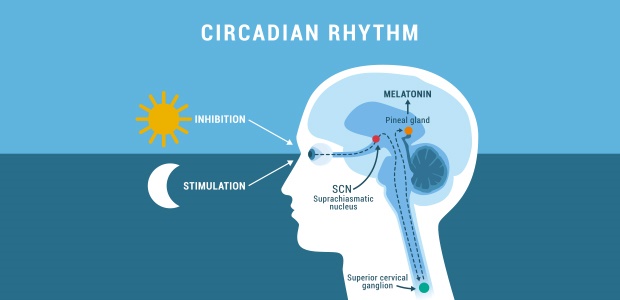![These circadian rhythms play an important role in our sleep-wake cycle and determine our sleeping habits. (1,2) [Image: Supplied]](https://cdn.24.co.za/files/Cms/General/d/9279/6f4765cb997b419cba66ec931d0c77c1.jpg)
Our bodies have their own internal circadian rhythms, which resetevery 24 hours. These circadian rhythms play an important role in our sleep-wake cycle and determine our sleeping habits.1,2
What are circadian rhythms?
Circadian rhythms refer, collectively, to the daily rhythms in our physiological functions. They control our sleep-wake cycle, modulate physical activity and food consumption, and over the course of a 24-hour day regulate body temperature, heart rate, muscle tone, and hormone secretion.
Melatonin helps to synchronise the circadian rhythm
The suprachiasmatic nucleus (SCN), also known as the master clock, regulates the pineal gland, which, when stimulated by darkness, secretes melatonin. Likewise exposure to light inhibits this process. This light-dark cycle maintains our circadian rhythmicity and regulates our sleep.
Desynchronisation of our circadian rhythm
The suprachiasmatic nucleus (SCN) deteriorates with age, which weakens or disrupts our circadian rhythms. Other circadian rhythm disturbances can also affect our sleep-wake-cycle by disrupting the gradual reduction of secretion of melatonin. A reduction in melatonin can reduce our sleep efficiency.
Bright light plays an important role in our sleep-wake cycle.
If we spend too little time in bright light it can lead to nigh-time sleep fragmentation and circadian rhythm sleep disorders. This is especially seen in the elderly.
Studies have demonstrated that the elderly that are institutionalised, have insufficient bright light exposure. The estimated time spent in bright light is about 1 hour for healthy elderly, 30 minutes for Alzheimer’s disease living at home and less that ten minutes for elderly living in nursing homes.
Melatonin treatment in the sleep-wake cycle
Melatonin treatment is associated with significantly reduced sleep onset latency, increase in sleep efficiency and increase sleep duration.4 It is also the first drug that demonstrated significant improvements in quality of sleep and morning alertness in patient age 55-years and older.5 Melatonin also improves daytime psychomotor functioning and is well tolerated.6,7
Types of circadian rhythm disorders (sleep-wake disorders)
• Advanced sleep-wake phase disorder3
o Difficulty staying awake in the early evening and waking up too early in the morning
• Delayed sleep-wake phase disorder3
o Falling asleep late and finding it difficult to wake up the next morning This can cause too little sleep and can affect daily activities
• Irregular sleep-wake rhythm disorder3
o Short periods of sleep and wake fullness. Not being able to sleep during the night and take multiple naps during the day, which can lead to excessive sleepiness
• Jet lag disorder3
o This is temporary and is usually due to traveling across two time zones in a short period. The sleep-wake rhythm is out of sync with the local time destination and can result in tiredness or being awake at the wrong time of day
• Non-24-hour- sleep-wake rhythm disorder3
o This occurs when a person’s sleep-wake rhythm is not in sync with the 24-hour day. Sleep time may be delayed, which can lead to sleeping in the afternoon instead of night. This happens because of limited exposure to light
• Shift work disorder3
o This affects people who work during the night or on a rotating schedule. They may not get enough uninterrupted sleep and this can cause insomnia, fatigue and sleepiness while working
Melatonin treatment in the sleep-wake cycle
Melatonin treatment is associated with significantly reduced sleep onset latency, increase in sleep efficiency and increase sleep duration.4 It is also the first drug that demonstrated significant improvements in quality of sleep and morning alertness in patient age 55-years and older.5
Melatonin also improves daytime psychomotor functioning and is well tolerated.6,7
For more information on insomnia visit www.sleepless.co.za and download your free sleep diary. Ask your doctor about the only registered melatonin tablet in South Africa.
References:
1. Stepnowsky CJ, Ancoli-Israel S. Sleep and Its Disorders in Seniors. Sleep Med Clin 2008;3(2):281-293.
2. Doghramji K. Melatonin and Its Receptors: A New Class of Sleep-Promoting Agents. Journal of Clinical Sleep Medicine 2007;5(3):S17-S23.
3. National Heart, Lung and Blood Institute. Circadian Rhythm Disorders. [online] 2019 [cited 26 August 2020] Available from: URL: https://www.nhlbi.nih.gov/health-topics/circadian-rhythm-disorders
4. Masters A, Pandi-Perumal SR, Seixas A, Girardin JL, McFarlane SI. Melatonin, the Hormone of Darkness: From Sleep Promotion to Ebola Treatment. Brain Disord Ther 2014;4(1):1-10.
5. Lemoine P, Nir T, Laudon M, Zisapel N. Prolonged-release melatonin improves sleep quality and morning alertness in insomnia patients aged 55 years and older and has no withdrawal effects. J Sleep Res 2007;16:372-380.
6. Luthringer R, Muzet M, Zisapel N, Staner L. The effect of prolonged-release melatonin on sleep measures and psychomotor performance in elderly patients with insomnia. Int Clin Psychopharmacol 2009;24(5):239-249.
7. Wade AG, Ford I, Crawford G, McMahon AD, Nir T, Laudon M, et al. Efficacy of prolonged release melatonin in insomnia patients aged 55-80 years: quality of sleep and next-day alertness outcomes. Curr Med Res Opin 2007;23(10):2597-2605.
Litha Pharma (Pty) Ltd. Reg. No.: 1994/008717/07. 106 16th Rd, Midrand. Tel. nr.: 087 742 -1860. www.acino.co.za. LP3249 09/2020
This post and content is sponsored, written and provided by Acino.




 Publications
Publications
 Partners
Partners

























